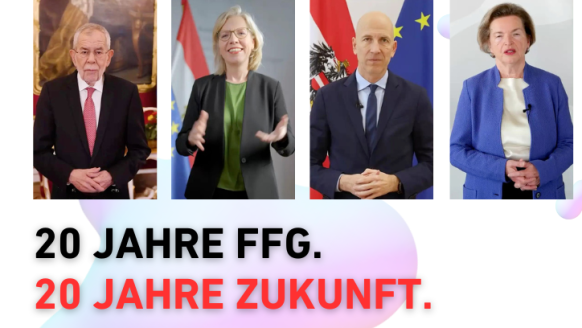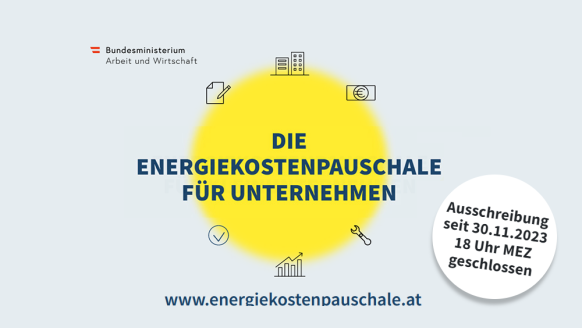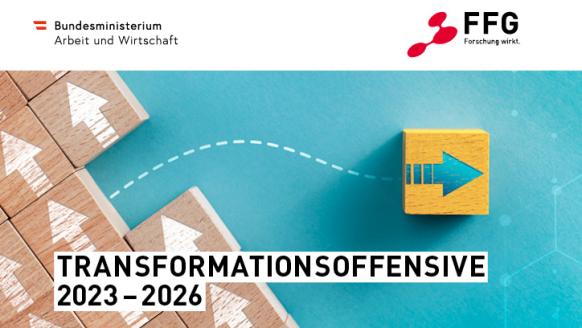Digitale Technologien ermöglichen neue Dienstleistungen, eine intelligente Produktion, neue Formen der Steuerung von Prozessen und Warenströmen sowie von Geräten. Sie durchdringen alle gesellschaftlichen und Lebensbereiche und ermöglichen als Basis- und Querschnittstechnologie den wissenschaftlichen und technologischen Fortschritt in vielen Bereichen. Der rasche Ausbau von Breitbandnetzen in ganz Österreich ist daher für Wirtschaft und Gesellschaft besonders wichtig.
> Alle Förderungen zu diesem Thema
-
Ausschreibung laufend geöffnet - Anträge können jederzeit eingereicht werden
Verbesserung der flächendeckenden Verfügbarkeit von symmetrischen Gigabit-Zugängen
-
Ausschreibung laufend geöffnet - Anträge können jederzeit eingereicht werden
Kooperative Forschung und Technologieentwicklung in den Forschungskategorien industrielle Forschung und experimentelle Entwicklung
-
Ausschreibung offen von
30.11.2023 12:00
bis
08.05.2024 12:00
Ausschreibung zum Grünen und Digitalen Wandel
-
Ausschreibung offen von
23.02.2024 14:00
bis
14.05.2024 14:00
2. Ausschreibung der Cofunded Partnership Transforming Health and Care Systems
-
Ausschreibung offen von
05.04.2024 09:00
bis
14.08.2024 12:00
Eine Initiative des Landes Oberösterreich im Rahmen der Wirtschafts- und Forschungsstrategie #upperVISION2030.
-
Ausschreibung offen von
06.02.2024 17:00
bis
17.09.2024 17:00
Transnationale kooperative F&E Projekte
-
Ausschreibung offen von
29.02.2024 09:00
bis
29.05.2024 17:00
6. Ausschreibung (Arbeitsprogramm 2023-24)
-
Ausschreibung offen von
15.11.2023 08:00
bis
24.09.2024 17:00
Ausschreibungsübersicht
-
Ausschreibung laufend geöffnet - Anträge können jederzeit eingereicht werden
Förderung der Projektvorbereitungskosten für konkrete F&E-Unternehmensprojekte
-
Ausschreibung laufend geöffnet - Anträge können jederzeit eingereicht werden
Förderung "kleinerer" F&E-Unternehmensprojekte für KMU und Startups
-
Ausschreibung laufend geöffnet - Anträge können jederzeit eingereicht werden
Unternehmensprojekte aller Unternehmensgrößen mit Verwertungspotential
-
Ausschreibung laufend geöffnet - Anträge können jederzeit eingereicht werden
Vorwettbewerbliche Branchenforschungsprojekte
-
Ausschreibung laufend geöffnet - Anträge können jederzeit eingereicht werden
International ausgerichtete F&E-Projekte mit Fokus auf Klima- und Umweltschutz und Transformation
-
Ausschreibung laufend geöffnet - Anträge können jederzeit eingereicht werden
Unterstützung für Unternehmen der Halbleiterindustrie und das zugehörige Wertschöpfungsnetzwerk
-
Ausschreibung laufend geöffnet - Anträge können jederzeit eingereicht werden
Wirkungsvolle Lösungen mittels iterativer Innovationsmethoden
-
Ausschreibung laufend geöffnet - Anträge können jederzeit eingereicht werden
Forschungsleistungen von Forschungseinrichtungen bis zu € 10.000 bezahlen (De-minimis Beihilfe)
-
Ausschreibung laufend geöffnet - Anträge können jederzeit eingereicht werden
Der direkte Weg zur Patentanmeldung
-
Ausschreibung laufend geöffnet - Anträge können jederzeit eingereicht werden
Unterstützung für Startups zur Verwertung und Markteinführung von Produkten oder Dienstleistungen
-
Ausschreibung offen von
08.03.2024 08:00
bis
30.04.2024 12:00
Ihre disruptive oder radikale Idee für eine bessere Zukunft benötigt gute Vorbereitung.
-
Ausschreibung laufend geöffnet - Anträge können jederzeit eingereicht werden
Fundierte Innovationsprozesse sind die beste Basis, um bahnbrechende Lösungen für gesellschaftliche Probleme zu finden.
-
Ausschreibung offen von
22.03.2024 08:00
bis
18.12.2026 12:00
Life Sciences-Branche in Österreich durch Forschungsförderung und nationale wie internationale Vernetzung ausbauen und stärken
-
Ausschreibung offen von
13.03.2024 12:00
bis
19.06.2024 12:00
-
Ausschreibung laufend geöffnet - Anträge können jederzeit eingereicht werden
Innovation durch Vielfalt
























